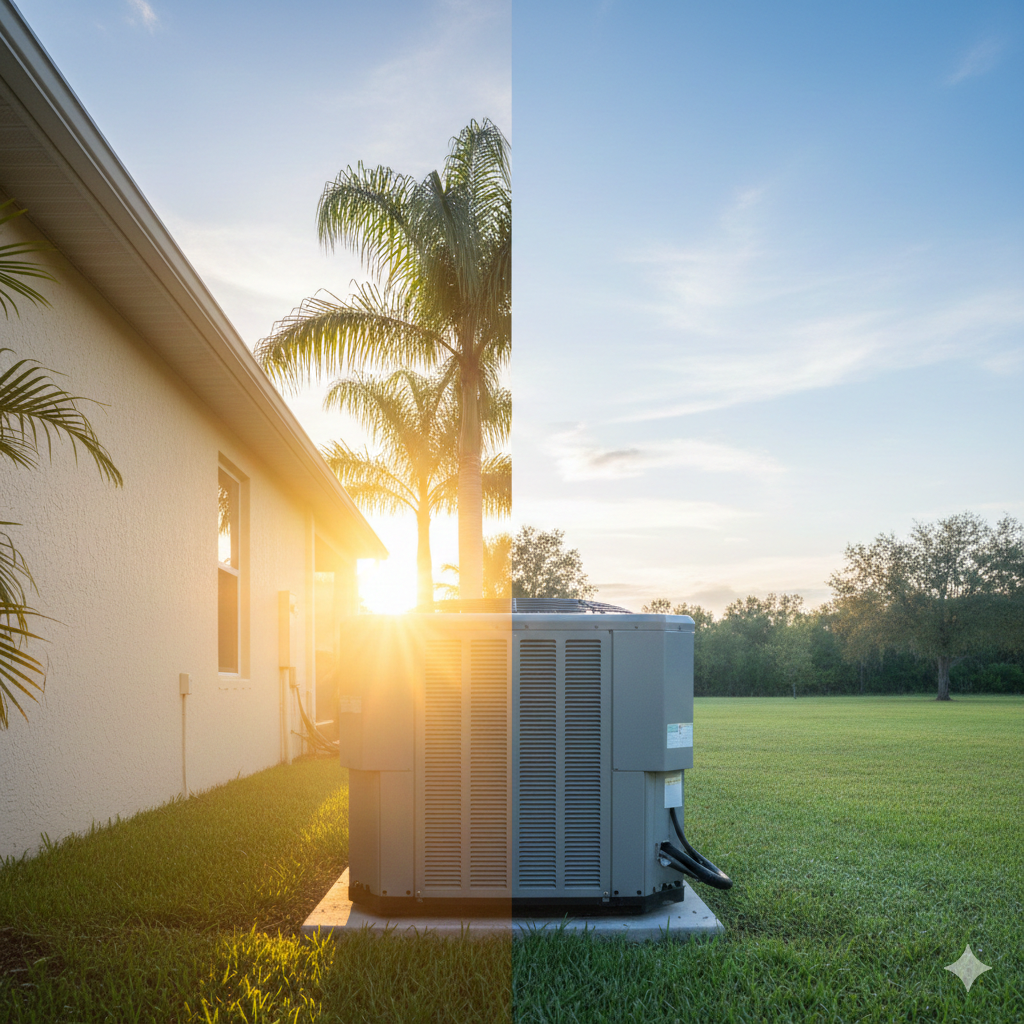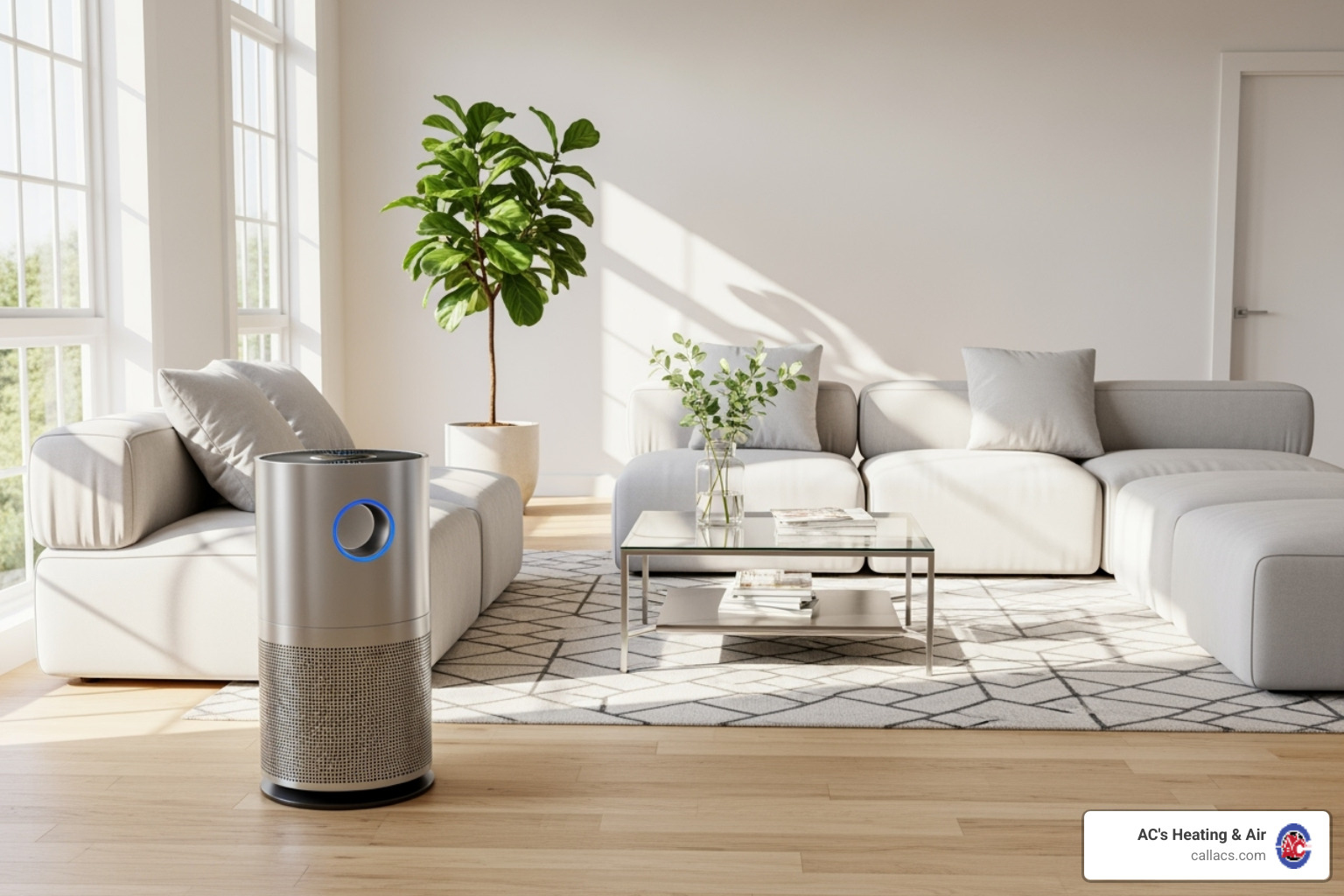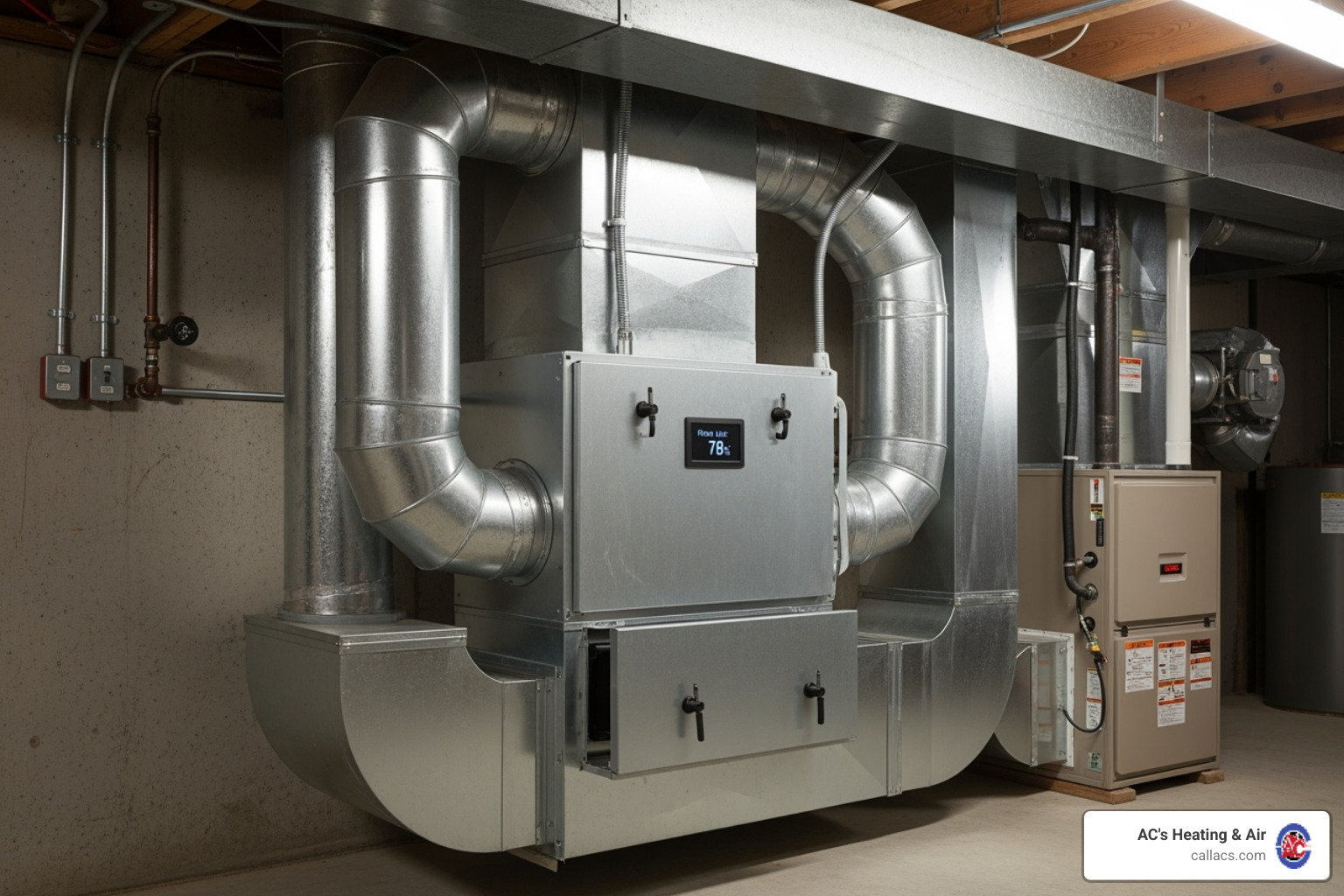A Guide To Staying Cool: Understanding AC Maintenance and Repair Options

A Guide to AC Maintenance and Repair Options
AC cool air is an essential part of modern comfort, especially in Central Florida where temperatures can soar. If you're in a hurry, here are key points about AC cool air:
- Air conditioning dates back centuries, but modern A/C systems are crucial for comfort today.
- Regular maintenance is vital to keep your AC running efficiently and avoid unexpected breakdowns.
Now, let’s dive in.
History of AC
Air conditioning isn't just a modern luxury. Ancient civilizations like the Egyptians and Romans used passive cooling methods such as double-walled structures and water-filled aqueducts to cool their spaces. These early innovations laid the groundwork for the more advanced, powered air conditioning systems we have today. By the 20th century, powered A/Cs became widespread, revolutionizing how we live and work.
Importance of Maintenance
Regular AC maintenance ensures that your system runs efficiently, reducing the risk of unexpected breakdowns. This not only saves you money on costly repairs but also extends the life of your unit. Proper upkeep like changing filters, cleaning coils, and checking refrigerant levels ensures that your AC continues to produce cool, refreshing air throughout the year, keeping your home or business comfortable and your energy bills lower.

How AC Systems Work
Understanding how your AC system works can help you better maintain it and troubleshoot common issues. Let's break down the main components: the compressor, condenser coil, evaporator coil, and refrigerant.
Compressor
The compressor is often referred to as the "heart" of the system. Located in the outdoor unit, it pressurizes the refrigerant gas, making it hot and ready to release heat. Think of the compressor as a large electric pump that drives the entire cooling process.
Condenser Coil
Once the refrigerant is compressed, it moves to the condenser coil, also in the outdoor unit. Here, a large fan pulls outdoor air through the coil, allowing the refrigerant to release its heat. As the air absorbs the heat, the refrigerant cools down and turns back into a liquid. This process is crucial for removing heat from your home.
Evaporator Coil
The evaporator coil is located inside your home, usually in the air handler or furnace. As warm indoor air blows over the cold evaporator coil, the refrigerant inside absorbs the heat, cooling the air. This cooled air is then circulated back into your living spaces, making your home comfortable.
Refrigerant
Refrigerant is the lifeblood of your AC system. It circulates through the system, absorbing and releasing heat to cool your home. In the evaporator coil, the refrigerant absorbs heat from the indoor air and turns into a gas. It then travels to the compressor and condenser coil, where it releases the heat outside and turns back into a liquid. This cycle repeats continuously, ensuring a steady supply of cool air.

Understanding these components and their roles can help you appreciate the complexity of your AC system and the importance of regular maintenance to keep everything running smoothly.
Next, we'll dive into common AC problems and their solutions.
Common AC Problems and Solutions
Even the best-maintained AC systems can run into issues. Here are some common problems and how to solve them:
Not Cooling
When your AC isn't cooling properly, it can be frustrating, especially during a heatwave. Here are some reasons why this might happen:
- Thermostat Settings: Ensure your thermostat is set to "cool" and that the temperature is lower than the current room temperature. Sometimes, a simple adjustment can solve the problem.
- Clogged Filters: A clogged filter can restrict airflow, making it hard for your AC to cool the air. Check and replace your filters regularly. According to Forbes, a clogged filter is a common culprit for cooling issues.
- Refrigerant Levels: Low refrigerant can lead to inadequate cooling. If you suspect a leak, call a professional to inspect and refill the refrigerant.
Blowing Hot Air
If your AC is blowing hot air, it could be due to several reasons:
- Dirty Condenser Coils: The condenser coils release heat from the refrigerant. If they are dirty, they can't do their job effectively. Cleaning the coils can often solve this problem. Forbes highlights that dirty condenser coils are a common issue.
- Power Issues: Sometimes, the outdoor unit loses power, causing the indoor unit to blow warm air. Check your circuit breaker or fuse box to ensure everything is in order.
- Refrigerant Leak: A refrigerant leak can also cause your AC to blow hot air. This issue needs professional attention to fix the leak and refill the refrigerant.
Leaks
Leaks can cause significant damage if not addressed promptly:
- Water Leaks: Water leaks often result from blocked or broken condensate drains. Ensure the drain is clear of debris. If the leak persists, it might be time to call a professional.
- Refrigerant Leaks: As mentioned, refrigerant leaks can affect cooling performance. They are also harmful to the environment. If you notice a refrigerant leak, contact a professional immediately.
Strange Noises
Unusual noises from your AC can indicate various issues:
- Banging or Clanking: These sounds often mean there's a loose or broken part inside the compressor. Turn off your AC and call a technician.
- Hissing or Whistling: This noise could indicate a refrigerant leak or a problem with the ductwork. Both issues require professional attention.
- Buzzing: Buzzing sounds can be due to electrical issues, loose parts, or debris in the unit. Turn off your AC and inspect it. If you can't find the problem, call a professional.
Regular maintenance can prevent many of these issues. Next, we'll explore AC Maintenance Tips for Optimal Performance to help you keep your system in top shape.
Florida AC Maintenance Tips for Optimal Performance
Regular maintenance is key to keeping your air conditioner running smoothly and ensuring ac cool air when you need it most. Here are some essential tips:
Filter Changes
Why It's Important:
Dirty filters can block airflow and reduce your AC's efficiency. They can also allow dust and allergens to circulate, affecting indoor air quality.
How Often to Change:
Change your filters every 1-2 months during peak usage seasons. If you have pets or allergies, you might need to change them more frequently.
How to Change:
1. Turn off your AC.2. Locate the filter (usually behind a grille in the wall, ceiling, or in the unit itself).3. Remove the old filter and replace it with a new one, ensuring it fits snugly.
Coil Cleaning
Why It's Important:
Coils can accumulate dirt over time, which reduces their ability to absorb heat. This can make your AC work harder, leading to higher energy bills and potential system failure.
How Often to Clean:
Clean the coils at least once a year, ideally before the cooling season begins.
How to Clean:
1. Turn off the AC and disconnect the power.2. Remove the outer casing of the unit.3. Use a soft brush or a vacuum to remove dirt and debris from the coils.4. For a deeper clean, use a coil cleaner spray available at most hardware stores.
Checking Refrigerant Levels
Why It's Important:
Low refrigerant levels can lead to your AC blowing warm air or freezing up. Proper refrigerant levels ensure efficient cooling.
How Often to Check:
Check refrigerant levels once a year. If you notice a drop in cooling performance, it could be a sign of a leak.
How to Check:
1. This task is best left to professionals, as handling refrigerants requires special equipment and knowledge.2. A technician will measure the current refrigerant level and check for leaks.3. If needed, they will recharge the refrigerant to the optimal level.
Regular maintenance not only keeps your AC in top shape but also extends its lifespan and improves energy efficiency.
Next, let's delve into Understanding AC Cool Air to learn more about how your AC keeps you comfortable and how to ensure it’s always producing cool air.
Understanding AC Cool Air
What Does AC Cool Air Mean?
AC cool air refers to the process of removing heat from an indoor space to create a comfortable environment. Known as comfort cooling, this process not only lowers the temperature but also controls humidity levels. This makes your living space more pleasant, especially during hot weather.
How to Ensure Your AC Is Producing Cool Air
To keep your AC producing cool air efficiently, follow these tips:
- Thermostat Settings:
- Set your thermostat to a comfortable temperature, typically around 68 degrees Fahrenheit. This is often the most energy-efficient setting.
- Ensure your thermostat is not exposed to direct sunlight or other heat sources, which can cause inaccurate readings.
- Regular Maintenance:
- Filter Changes: Replace your air filters regularly, ideally every 1-3 months. This keeps the airflow smooth and the air quality high.
- Coil Cleaning: Clean the evaporator and condenser coils to prevent dirt buildup, which can reduce cooling efficiency.
- Refrigerant Levels: Have a professional check and maintain the correct refrigerant levels. Low refrigerant can cause your AC to blow warm air.
- Professional Check-Ups:
- Schedule regular maintenance with a professional service like AC's Heating & Air LLC. Their expertise ensures your system runs efficiently and catches potential issues early.
Benefits of Efficient AC Systems
- Energy Savings:
- Efficient AC systems consume less electricity, reducing your energy bills. According to the International Energy Agency, air conditioning accounts for 20% of electricity usage in buildings globally. An efficient system can significantly cut down this consumption.
- Cost-Effectiveness:
- Regular maintenance and efficient operation mean fewer breakdowns and repairs, saving you money in the long run.
- Environmental Impact:
- Efficient systems use less energy and produce fewer greenhouse gases. Newer refrigerants like HFOs have lower global warming potential, reducing the environmental impact.
By understanding and maintaining your AC system, you ensure it produces cool air efficiently, saving you money and helping the environment.
Next, let’s explore how to choose the right AC maintenance service to keep your system in top condition.
Choosing the Right AC Maintenance Service
Importance of Professional AC Services
When it comes to keeping your AC cool air flowing efficiently, professional services are a must. Experts have the skills and tools to handle complex tasks safely. They ensure your system runs smoothly, preventing costly breakdowns.
Here’s why professional AC services matter:
- Expertise: Trained technicians know the ins and outs of HVAC systems. They can spot issues that untrained eyes might miss.
- Tools: Professionals have specialized tools that ensure precise repairs and maintenance.
- Reliability: Trustworthy services offer consistent results, giving you peace of mind.
AC's Heating & Air LLC
At AC's Heating & Air LLC, we offer tailored maintenance plans to suit your needs. Our expert team is dedicated to keeping your home comfortable year-round.
Here’s what sets us apart:
- Tailored Maintenance Plans: We design plans that fit your specific system and usage patterns. This ensures optimal performance and longevity.
- Efficiency: Regular maintenance checks keep your system running at peak efficiency, saving you money on energy bills.
- Reliability: Our technicians are known for their prompt and reliable service. We prioritize your comfort and satisfaction.
When to Call a Professional
Knowing when to call a professional can save you from bigger problems down the line. Here’s when you should reach out:
- Major Repairs: If your AC system is making strange noises, leaking, or not cooling properly, it’s time to call in the experts.
- Regular Check-Ups: Scheduled maintenance helps catch issues early and keeps your system running smoothly.
- Installation: Installing a new system? Professionals ensure it’s set up correctly for maximum efficiency and longevity.
By choosing the right AC maintenance service, you ensure your system produces cool air efficiently and reliably.
Next, let’s answer some frequently asked questions about AC cool air.
Frequently Asked Questions about AC Cool Air
Why is My AC Not Cooling?
Your AC might not be cooling for several reasons:
- Thermostat Issues: Sometimes, the thermostat is not set to the correct temperature. Make sure it's set to "cool" and the desired temperature is lower than the room temperature.
- Clogged Filter: A dirty filter can block airflow, making it hard for your AC to cool the air effectively. Check and replace the filter if needed.
- Dirty Coils: The condenser coils might be dirty. These coils release heat outside, and if they are covered in grime, they can't do their job well. Clean them regularly.
- Refrigerant Leak: Low refrigerant levels due to a leak can prevent the AC from cooling. This issue requires professional attention to fix the leak and refill the refrigerant.
- Power Issues: Sometimes, the outdoor unit loses power due to a tripped circuit breaker or a blown fuse. Check your electrical panel to ensure everything is in order.
How Can I Improve the Efficiency of My AC?
Improving your AC's efficiency is key to saving energy and money. Here are some tips:
- Regular Maintenance: Schedule professional maintenance at least once a year. This includes cleaning coils, checking refrigerant levels, and inspecting the whole system.
- Filter Changes: Replace your AC filter every 1-3 months. A clean filter ensures better airflow and efficiency.
- Thermostat Settings: Use a programmable thermostat to automatically adjust the temperature. Set it higher when you're not home to save energy.
- Seal Leaks: Ensure your home is well-insulated and seal any leaks around doors and windows. This prevents cool air from escaping and warm air from entering.
- Shade the Unit: If possible, place your outdoor unit in a shaded area. This helps it run more efficiently by keeping it cooler.
What Regular Maintenance Does My AC Need?
Regular maintenance keeps your AC running smoothly and efficiently. Here are some essential tasks:
- Change Filters: As mentioned, replace filters every 1-3 months. This is one of the simplest yet most effective maintenance tasks.
- Clean Coils: Both the evaporator and condenser coils should be cleaned annually. Dirty coils reduce efficiency and can cause the system to overheat.
- Check Refrigerant Levels: Low refrigerant can lead to poor cooling and increased energy consumption. Have a professional check and refill it if necessary.
- Inspect Ducts: Ensure that ducts are clean and free of leaks. Blocked or leaking ducts can waste a lot of energy.
- Test Thermostat: Make sure your thermostat is working correctly. A malfunctioning thermostat can lead to inefficient cooling.
By following these maintenance tips, you can ensure your AC produces cool air efficiently and keeps your home comfortable.
Importance of Regular Maintenance
Regular maintenance is key to keeping your AC system running smoothly and efficiently. Neglecting routine upkeep can lead to a host of problems, including higher energy bills, reduced cooling capacity, and even complete system breakdowns. By taking simple steps like changing filters, cleaning coils, and checking refrigerant levels, you can extend the life of your AC unit and ensure it continues to produce cool air effectively.

Choosing the Right Service Provider
When it comes to AC maintenance and repair, choosing the right service provider is crucial. A professional team brings the expertise, tools, and reliability needed to handle any issue, big or small. At AC's Heating & Air, we offer tailored maintenance plans designed to keep your systems running smoothly year-round. Our team is committed to ensuring your comfort with prompt responses and personalized solutions.
For residents of Orange County, FL, we proudly serve a wide range of communities, ensuring that your home remains cozy and comfortable no matter the season. Trust us for all your HVAC needs, from installation to emergency repairs.
Learn more about our services and how we can help you stay cool.
By prioritizing regular maintenance and choosing a reliable service provider, you can enjoy the benefits of a well-functioning AC system, including energy savings, cost-effectiveness, and a comfortable living environment. Don't wait for a breakdown; take proactive steps today to keep your AC in top shape.



